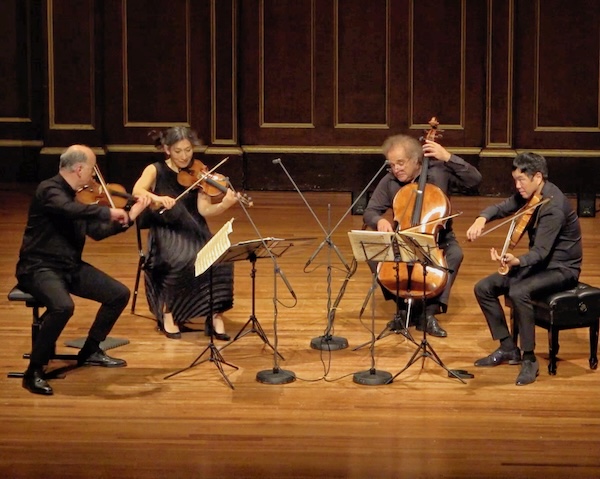Impressive new work finds companionable home with Takács Quartet

The Takács Quartet performed Friday night at Jordan Hall for the Celebrity Series. Photo: Robert Torres
Rarely does it happen that a new string quartet finds itself in the company of similar works by Franz Josef Haydn and Ludwig van Beethoven and emerges unscathed. Yet Nokuthula Ngwenyama’s Flow did just that in its regional premiere at Jordan Hall on Friday, courtesy of the Takács Quartet and the Celebrity Series (The concert was heard and seen via the virtual relay on Sunday evening.)
A four-movement, twenty-minute-long score, Flow, which was co-commissioned by the Series, evidently reflects some of its composer’s varied scientific, philosophical, and theological interests. Ngwenyama provided a convoluted program note discussing as much.
Though the document wasn’t very promising (its clinching phrase reads: “Enjoy and go with the Flow, we only know what we know”), the work itself proved as immediate, ingratiating, and accessible a musical argument as they come.
Ngwenyama’s writing ranges widely. The Prelude draws on extended techniques before settling into a series of characterful episodes that take shape and suddenly disintegrate. In the ensuing Lento, bent-note chorale statements alternate with soulful solo passages.
Whether or not the third movement, called “Quark Scherzo,” actually evokes “our sub-atomic realm giddily waltz[ing] up and down while we embrace the ideas of solidity and ego” is anybody’s guess. Such tedious notions hardly crossed one’s mind listening to the music’s endearingly pop-ish phrasings and syncopations on Sunday.
Nor did the finale’s simulations of “Cosmic Microwave Background radiation” register. What did come across, though, was the music’s blissed-out mellifluousness, especially during its soaring, unapologetically tuneful apotheosis. That was gloriously, radiantly sincere and affecting – so much so that even Flow’s decisive, fortissimo last chord felt neither derivative nor predictable but, instead, fully earned.
In that regard, Flow was right at home with the night’s other offerings.
Hailing from his last completed collection in the genre, Haydn’s “Sunrise” Quartet (Op. 76 no. 4) boasts the expected mastery of technique and style.
Fittingly, the Takács’ reading at Jordan was anything but stuffy or formal. They imbued the Allegro’s ascending first theme with soaring warmth, while the livelier passages snapped jauntily. So did the finale: the accelerando over its last half unfolded with carefree exuberance.
In between came a devotional account of its luminous Adagio and a droll reading of the Menuetto. The latter didn’t stint on acid. Indeed, the Takács took a decidedly rustic approach to it, with bagpipe-like drones in the Trio and playful phrasings throughout.
The group brought a similar sense of bucolic spirit to bear on the corresponding third movement in Beethoven’s E-minor “Razumovsky” Quartet (Op. 59 no. 2). Here, their full-bodied, lusty take on this Allegretto underlined its composer’s debts to his old teacher.
At the same time, their interpretation highlighted the novelty of Beethoven’s approach to the genre. The outer movements came over as studies in intensity, the big Allegro carefully paced while the finale snapped impatiently at the bit. Still, both of them found moments to sing.
So did the great Molto adagio, which emerged in the Takács’ hands as the monumental, mystical essay it is, serene and inexorable. One hardly need be encouraged to go along with this music’s flow; rather, it came and carried all else before it.
The program is available to stream until February 24. Celebrity Series presents baritone Justin Austin and pianist Howard Watkins in recital 7:30 p.m. February 21 at Pickman Hall. celebrityseries.org
Posted in Performances